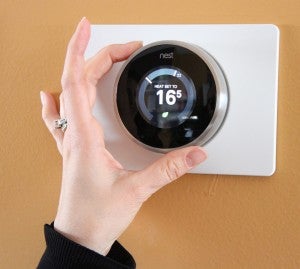One Million and Beyond: Rebates to Accelerate Smart Thermostat Adoption in Illinois
 One million is a big number, but that’s the goal for getting smart thermostats into Northern Illinois homes. In partnership with environmental and consumer groups, Chicago-based electric and gas companies this week agreed to offer rebates that will cut an intelligent monitor’s cost in half, helping empower people to reduce both their energy bills and pollution.
One million is a big number, but that’s the goal for getting smart thermostats into Northern Illinois homes. In partnership with environmental and consumer groups, Chicago-based electric and gas companies this week agreed to offer rebates that will cut an intelligent monitor’s cost in half, helping empower people to reduce both their energy bills and pollution.
This smart-thermostat initiative is the nation’s largest and makes devices eligible for up to $120 in rebates (on average, a smart thermostat will run you about $250). The partnership between the utilities and advocacy groups expects the financing will lead to the installation of one million smart thermostats across Northern Illinois over the next five years.
A diverse group announced the program this week: Commonwealth Edison (ComEd), Nicor Gas, Peoples Gas, North Shore Gas, Environmental Law & Policy Center, Illinois consumer advocacy group Citizens Utility Board, Illinois Commerce Commission, and smart thermostat manufacturers, ecobee and Nest.
Smart thermostats lead to smarter energy use
Smart thermostats are WiFi-enabled devices that allow residents to easily control the heating and air conditioning settings in a home through their smartphones, tablets, and computers. On the simplest level they enable people to easily switch off their air conditioning or heating when the house is not occupied, but the technology is considered smart because, over time, it will do this for you by learning your behavior patterns.
For instance, some devices automatically learn when the house is likely to be occupied or empty, allowing the thermostat to pre-heat or pre-cool the house in order to provide a comfortable temperature when a resident arrives. Zoned systems also can control the temperature in individual rooms, providing energy savings when only a home office, and not the bedrooms, needs to be heated on a winter’s day, for example. Residents remain comfortable when they’re home, but save money on heating and cooling while away at work, on vacation, or even in a different room.
[Tweet “1 million & beyond: Rebates to accelerate smart thermostat adoption in Illinois”]
The devices also empower people to customize their energy use, creating substantial opportunities for cost-effective energy savings. Rather than leaving homes at a constant temperature, the Nest Learning Thermostat, for example, has been shown to save people about 10 to 12 percent on their heating bills and about 15 percent on their cooling bills on average.
Smart thermostats tend to have several unique characteristics. They:
- Allow remote access to the unit and control of the heating and cooling (HVAC) system from a web portal or smartphone application.
- Offer the option to program a custom schedule to reduce energy use when residents are away from home.
- Report on performance of the HVAC system.
- Alert people when a problem arises with their HVAC system or when it is time for equipment maintenance.
- Display the current weather and five-day forecast.
Furthermore, smart thermostats enable energy efficiency, which means less demand on the grid and less power plant pollution. They also help unlock the potential of demand response, a cost-effective energy savings tool that rewards people for conserving the electricity when the grid is stressed. If you have a smart thermostat and agree to participate in a demand response event, your thermostat will automatically be minimally adjusted to ease the burden on the grid.
With this new initiative to bring one million intelligent devices to homes, Northern Illinoisans will be able to tap into energy and cost savings, all while breathing cleaner air from less carbon emissions.
Photo source: Flickr/Green Energy Futures










